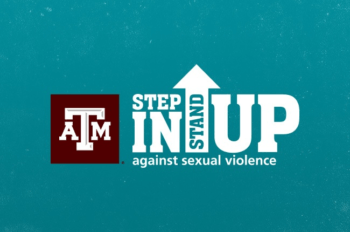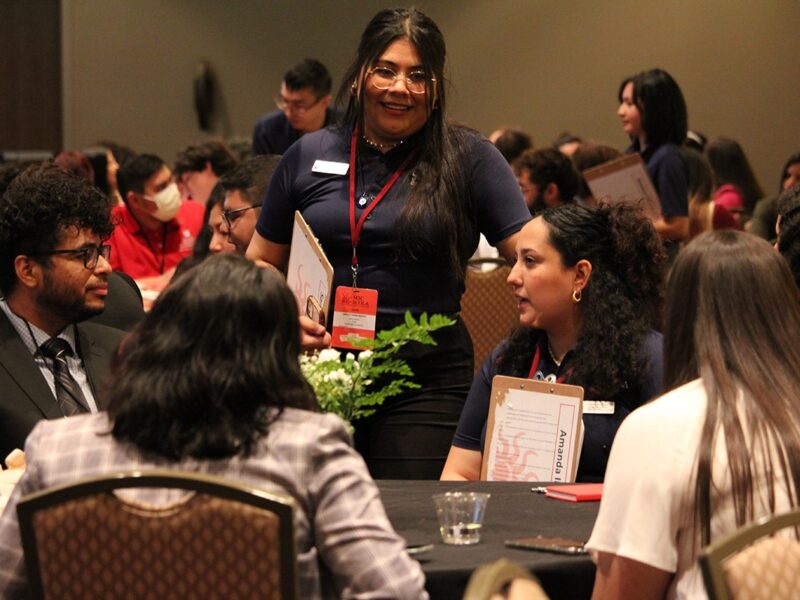“Tell Somebody” Helps Keep Students, Faculty And Staff Safe

A team of dedicated professionals at Texas A&M stands ready to help students, faculty and staff by intervening when concerning behaviors are reported to them. Their goal: to prevent a larger problem or crisis from occurring. It is called the Special Situations Team and its campaign is called “Tell Somebody.”
The premise is simple: what would you do if a student stopped showing up for class or started using troubling references in his or her papers? How about if a normally even-tempered faculty or staff member began to behave erratically? Would you tell somebody?
“For a team like this to work, it means the campus community is looking after its own,” says Cynthia Hernandez, assistant vice president for student affairs. “Caring for each other is very much a part of the culture at Texas A&M; it’s what the Aggie family is all about.”
Hernandez explained that after the tragic mass shooting at Virginia Tech in 2007, Texas A&M convened a task force to re-examine how university personnel look at threat assessment and campus emergencies. Although such teams had existed at this university and others for decades, they existed in silos around particular units; for example, Human Resources always had a team as did Student Affairs.
“One critical thing we learned from Virginia Tech,” Hernandez continues, “was that the shooter had exhibited concerning behaviors in several different areas but there had been no way to connect the dots. By having one team that is comprised of leaders of all relevant units – student affairs, student counseling services, student life, the dean of faculties, the employee assistance program, residence life and the university police – we can finally see the total picture.
“Our ability to see the entire picture puts Texas A&M on the leading edge of college intervention teams,” adds Hernandez. “Not only that, but we’re probably the first to include all three constituents – students, faculty and staff.”
The Special Situations Team was initiated by David Parrott, executive associate vice president for student affairs. Parrott convened the first meeting on February 2008 and Hernandez has been the convener for approximately five years. The team meets once a month and receives intensive training once a year. They also accept invitations by various campus units that want to learn more about what they do.
“The team works because there is so much trust among members, “says Hernandez. “Everyone brings their lens . . . their area of expertise to the table and once we’ve discussed and analyzed a situation we triage it to the appropriate unit.”
Any member of the campus community can use “Tell Somebody” by going to the website and filling in the online report form. They can also call one of several numbers (*see below) to make a report. “There is an option to make an anonymous report, although that makes it more difficult to follow up and get the details needed to be most effective,” Hernandez adds.
“Once people understand that they are not in trouble, the focus switches. Individuals realize that this is about the campus community caring about them, and surrounding them with support and resources,” says Hernandez.
Martha Dannenbaum, director of student health services, puts it this way: “In most cases, ‘Tell Somebody’ is preventative. Someone in our campus community has an issue or problem and we can intervene in order to prevent something from happening before it does. I am thankful this team exists for the sake of the safety and well-being of our students, faculty and staff.”
The Special Situations Team is currently tracking approximately a number of separate issues reported by email, not including those that are reported by phone. Some are one-time occurrences while others are ongoing. The team’s aim is not to remove someone who has displayed a concerning behavior, as Dannenbaum explains. “Our hope is to be able to support them with whatever resources they need in order to remain at Texas A&M and be successful.
“I am proud of how much our students want to take care of their fellow Aggies,” Dannenbaum states. “They just want to help, and more and more they are realizing the tremendous value of what happens next . . . once they tell somebody.”
Numbers to call during business hours:
In reference to student behavior: (979) 845-3111
In reference to staff behavior: (979) 845-3711
In reference to faculty behavior: (979) 845-4274
Media contact: tamunews@tamu.edu.





